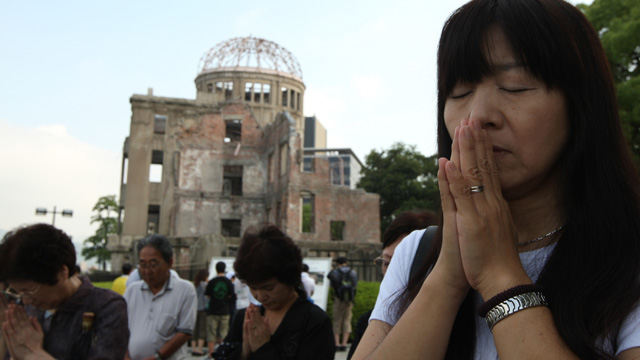Tuesday, December 31, 2013
Thursday, December 26, 2013
Pour saluer presqu'une fin a l'an 2013 - et une passation aux nouvelles oubliant le timonier et ses analogues: New York Times Article.
Exemple des croyances chinoises: Comment laisser "Le Grand Timonier" et ses enfants au moins de son comportement et de son esprit, ceci dit par chacun(e) selon leur propre niveau, aux annales de l'histoire (pour commencer) -- (encore opinion) article - et son image, impression, ses papiers, articles, textes, ... et ses photos iconographiques jusque dans les rayons d'anciens personnages dont la voix hante l'oreille des contemporains les plus curieux et immondes venant des engins de loin de chez eux - Cliquez une fois que vous ayez compris, et nous soyons amis amicales (au moins pour le moment je vous le promets). En court, oubliez tout cela pour le plaisir et le bien de tous maintenant, enfin assez. Se rappelles, et il le faut, cette fois que je vous l'aie promis.
Cette photo ne puisse, une fois y mise, sortir du dossier circulaire -- aussi, je vous l'assure encore depuis tous les bords de nos rencontres, communications, dialogues, ... .
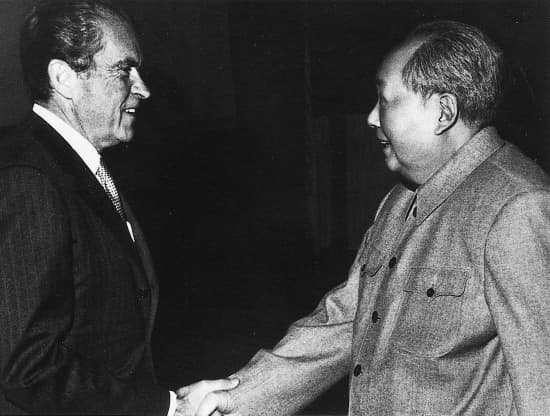 |
| Media Photo |
Monday, December 23, 2013
Release of Mikhail Khodorkovsky (Russia.)
 |
| Media Photo |
While I am sure that people like Mr. Khodorkovsky themselves have tremendous respect for the Kremlin, one reason why he appeared to allow the prosecutors to catch up to him and then that he even appeared at trial, and this despite the dubious character of the charges carried out against him, the idea that political activism and forces for liberal change in Russia continue to be muted by the regime are evident in every news report about the subject that has been published since some time ago. Along with this is a kind of anti - Western tone that pervades many Russian establishments and institutions that has an attitudinal bent warranting, i.e., some Adlerian psychological analysis and evaluation. While this will never happen, obviously many people are happy the Russian administration is able to deal with the politics of it and has allowed the release of Mr. Khodorkovsky to authorities in Germany who helped free him. His family and admirers are surely very happy with the German authorities and Chancellor Merkel for their help and this might be grist for the mill of European politics that continues to appeal to Eastern Europe, and there are editorials about this every day, to simmer down politically. The only judicial case in Russia I am able to remember in recent times or going as far back as the 1980's, for example, that has the same profile is the Scharansky story that was so well - publicized and covered in U.S. national papers for some time. Mr. Scharansky is apparently alive and well somewhere, and still greatly influencing international policy toward Russia and the former soviet union. Mr. Khodorkovsky, inasmuch as he has vowed to stay away from politics, might continue at present as just quietly talking to people about his circumstances and career that have been in primitive and repressive circumstances, and as a commentary on his home country now might speak outside of Russia on the whys and wherefores of his own path through business and administration and his sentence, and in a place now where one finds the listening much more accommodating in mind(s.)
Links:
Wednesday, December 18, 2013
"China Jade" ... "China Moon". Without Being "Scooby Doo", This Is Nonetheless Impressive (okay?)
 |
| China Media Photo |
Here, here! - See "Yutu," the Jade Rabbit.
Yahoo! News Story.
Xinhua News Story.
Bloomberg.
China Daily Story.
 |
| Media Photo |
 |
| Media Photo |
Enough Already? Yoda Needs a Job.
Either I did see an ages old special on
network television recently, or there is new interest among various
movie producers to film another “Star Wars” prequel or sequel.
This would be greatly exciting, not necessarily for the yuppie –
age Gene Roddenbury (sp?) fans, but for example, for my brothers'
kids who do enjoy and have like the past LucasFilm productions
featuring the famed conflict between the space Empire and the Luke
Skywalker crowd. I might be completely off – base here, but it
could be one might re – assemble the older cast, including R2,
etc., Chewbakka (sp?), Jabba the Hutt (sp?), the armies and bounty
hunters, shadows and ghosts of Darth Vader and the chief Emperor in
some huge cataclysmic, highly memorable movie that would, as Lucas
notoriously does, have the forces of good getting all the women and
limping across the finish line. Forget Ivan Reitmann for a minute,
and just image Yoda, image here, and crowd entering into the space
“Valhalla” after some very brilliant, well orchestrated, again
space rout of the bad guys. Remember the Yodas of the world never
have a chance against the lighting – strike forces of evil as
commanded by the Vaders and chief emperor types through their ultra –
multi computerized spacecraft that turn out as cream puffs when the
real battling happens. This would be impressive for everybody in
making a statement through the media without any political or other –
worldly charged language or imagery, not even the biblical
proportions sometimes ascribed to such things (no “Ben Hur”, or
“Ten Commandments” promised – land thematics or anything;) it
would be great! Get Lucas and his crowd again back to the core
competency and highly idea – oriented, technical and intellectual
work they have done for so long – putting greatly hopeful images
and dialogue / discussion in the public forum. They could use Pixar
again, too. This would be a great exercise in success for the old
film – making team, including Lucas himself, and more movie and
media awards awaiting, and this without any controlled substances or
anything else – just clean fun. Comments invited (especially from
your kids.)
Wednesday, December 11, 2013
By Bill O'Reilly (Henry Holt & Company, 2013:) - Book Review.
 |
| Media Photo |
In his well – researched text on the Christ story entitled Killing Jesus, Bill O’Reilly takes a humanistic and multi – disciplinary approach to this story and its details and plot, characters and principal actors. His investigative work and story – telling re – visit the integral parts of this Christian legend, and pages are filled with a rich and detailed portrayal of different features of the New Testaments’ telling of this remarkable life. Turning points and main features of the book include a depiction in detail, and this text of almost 250 pages is longer than any of the New Testament gospels, of the ideas and different informative topics about this pivotal story in Christianity and the Catholic faith, and even in Judaism for that matter - including the virgin birth, the flight into Egypt, the scene with the Christ child in the Temple with his elders, his meeting with and baptism story involving John the Baptist; the gathering of the Apostles with Christ as their spiritual and ideological leader, the emphasis upon Jesus as a humanistic and human character versus a literal miracle – worker. The story also takes into account the scenes between Christ and the Pharisees, money changers, and others at or near the Jerusalem Temple, The Sermon on the Mount, the politics of the day as ruled by the corrupt and overriding Roman regime involving various characters such as Antipas, Pilate, and the Herod kings. The story O’Reilly re – tells of the Passion and Crucifixion – essentially the stations of the cross, is a colourful and enticing narrative including the legend of Christ’s tomb and the post – mortem Pentecostal time when the Lord appeared among his disciples and apostles. This invites us to investigate for ourselves the personal meaning of this cosmological view of a charismatic and political figure from the ancient world.
None of these sub – plots are told or narrated as strictly from the standpoint of one, single gospel of the Bible’s New Testament, and O’Reilly allows for the rites, symbols, mysteries and their meanings to flow through to the reader on one’s own, personal level. These details form the overall outstanding and highlighted thematics that give a very personal impression for the reader of the mysteries of modern Christianity itself that allow for the cohesion, flow and different assertions of ideas in the text. From these literary currents as told through the author’s magnifying and examining literary lens, it is clear from the text that Christ was a complete natural, a greatly charismatic person regardless of whether or not one regarded or regards him as a spirit or a human prophet. As a figure in the ancient world, especially during the time of the Roman empire, and even today, he would have eschewed not the overall role of spiritual leadership, but by his nature again would have avoided the kind of window dressing and fluff that might accompany it. For this and other reasons, and the text implies as much, the followers of the Christ, Prince of Peace, Xavier, Son of God, the Nazarene, … , while not very numerous in the origins of what was at the time the new Catholic faith; the pattern of the fervor and contagion of the Christ story starting in the old times could not have been otherwise up to today with its massively populous following among people everywhere. This begs the question about what the authors of this text, O’Reilly and Dugard, would have to write about, briefly or at length, about the story of Saint Paul, for instance as it integrates into Catholicism from the Christ story itself and again the meaning these narratives have in the modern Catholic faith, in the doctrine and among the laiety. This review is after a reading and is not overall an endorsement nor rebuke of the ideas, themes, and topics, etc., discussed by the authors in the text. Overall an excellent book.
Avoiding Dialectic Revisionism - David Cameron in P.R.C. - December 2013.
 |
| From China News |
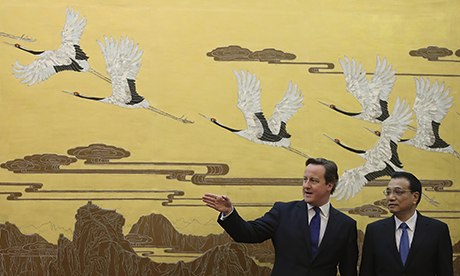 |
| With Li Ke Qian - Media Photo |
AND => "Joe" - this is precious.
 |
| Media Photo |
Friday, November 29, 2013
More Promises for Tourism - Iran.
 |
| Media Photo |
It is not absolutely clear in my own view as the literature with respect to the NPT is varying in its approach to this issue, while quite vast, and one is obviously not at liberty to read all of it; probably a task for a very large team of people, even in places like Iran. There is, however, one powerful overriding them that materializes on a high level when a people even begins to desire nuclear power and then nuclear weapons, even if they are so - called defensive weaponry along former - soviet style terms: When nuclear weapons are on a country's political and scientific agenda, mutual assurance, a common - sense and practical view with respect to either wide - area or massively destructive weaponry, when forgotten as it apparently has been de - emphasized in the approach to Iran due to issues involving places like Israel, for example, and other Mediterranean countries like Turkey that could popularly be sympathetic to Iran, can become an overriding factor in replying to the offenses of those who have nuclear power, but who are non - signatories and who are non - compliant with NPT
 |
| Media Image |
BBC Story.
Mortar Shelling A Damascus Mission.
 |
| Media Photo |
Links to this story:
a. Reuters.
b. Xinhua.net.
c. News from the U.N.
d. Russian News (in English).
e. Fox News - Van Susteren.
Friday, November 15, 2013
1 : Universal Compassion.
 |
| Media Photo |
The author speaks of “attachment” in the text that concerns
the kind of identification, psychological, religious, moral and political,
etc., that people in the modern world must have in order to be fully engaged in
their lives among others. In short, the book makes the point the world is
a denser place and there are other people in it besides just the first person
singular for everyone: The text outlines the problems with what are today
inappropriate and aggressive, and over – aggressive self – assertion and self –
importance as a way to overcome the everyday challenges, and even extraordinary
challenges we sometimes face in our somewhat different, then again parallel,
paths through life. The change, but in integrating it into a peaceful,
secular framework as presented in this writing. The main theme of the
text is compassion in its essence as accompanied and made of alleviating the
suffering of others, and promoting the well – being of others. The
foundations of the spirit of universal compassion are thus the pursuit of a
kind of collective or societal happiness and contentment of the family of
civilizations in view of and derivative of efforts to lessen and properly
address the attention of the world public on suffering in order to end the
destructive forces that cause the negative effects of suffering in its various
milieus. The Dalai Lama speaks of karma under the circumstances as having
a relation to causality with respect to the multi – faceted events affecting in
various degrees the lives of writing emphasizes themes such as selfless
individuation and altruism, service to others in the name of happiness and the
pursuit of happiness, social justice, political freedoms, passive resistance to
aggression and tyranny, selfless (again) righteousness, and more in a way that
appeals to the majority of ideas about humanism, freedom, justice, and
morality, etc., in the mindset of anyone who believes in self – autonomy and
morality, be it from any of the main cultural centers we all know and read and
see in the media every day. The author as well tells the reader in a
chapter on “Discernment” that the openness and dedication to success in one’s
life and the lives of others in its effectiveness depends greatly on the sense
of autonomy in everyone, perhaps even appealing to the idea that such a quality
is innate and is then refined through life’s experiences without the real
possibility of being taught from previous times.
The outward compassion the Dalai Lama has in this text, a
holy book for Buddhists, for his fellow colleagues, associates, the extended
human family; and the awe, respect, and attachment not only to other people but
to the environment and to nature is remarkable in this writing and shows the
indomitable attitude of the Buddhist faith against destruction, negative
influences in society and among the greater family of humans everywhere.
In its influence as a cosmology book, the text ranges in content and
context, directly and indirectly from topics like interpersonal relations and
psychology, learning and morality, the sciences including the author’s
knowledge of the neurosciences, the social sciences including the more negative
and utilitarian subject matter of economics, the development of and role of
religion in modern life including the importance of genetics and human and
biological possibilities and differentiation, languages and other arts, world
and regional politics, the history of India, and other quite important topics
of discussion by everyone. Overall, the type of universal compassion
talked about in this text might not be at home, for example, with those whose
perspective dates no further back than the Middle Ages, but the text might
prove extremely valuable, again not only for Buddhists and the followers of the
Dalai Lama, but for anyone interested in the discussion of psychology,
religion, and life sciences and their roles vis – a – vis each other and more
in the modern era with its many influences and religions and secular mindsets
alike.
Saturday, November 2, 2013
Benjamin Bernanke's Federal Reserve: 2005 - 2013.
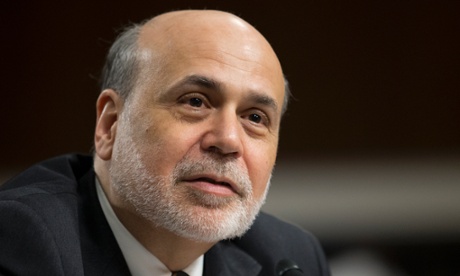 |
| Media Photo |
Benjamin Bernanke, at the time he inherited the job as Chairman of the U.S. Federal Reserve had more challenges ahead of him that any Fed. Chief in recent memory. His predecessor, Mr. Alan Greenspan, arrived at his Fed. Reserve Chairman appointment with a stellar resume from business and industry and had followed an empirical path through the economics and banking world to his job at the U.S. Federal Reserve starting on or about 1987 and ending in 2005 (eighteen years.) Bernanke was a change from Greenspan as a tough act to follow, and as the new Fed. Chairman confirmed in 2005 had a career in academia that dealt with the same level of statistical detail and analysis as his predecessor, though the emphasis of the Bernanke Federal Reserve was necessarily anti – inflation targets, troubled assets, interest rate targets, Quantitative Easing, and easing monetary policy among other things that have been his calling for the past seven or eight years. The Federal Reserve has many schools of capitalist economics just in the air and around its various personalities and public figures, of which a Keynsian framework that has had overall a great influence on economic modernism and to which Ben Bernanke has made substantive and substantial contributions including that of easy money and a methodological approach to and adaptive use and interpretation of economic information and statistics. This has been primarily due to Bernanke’s Chairmanship at the Fed calling for and integrating the features of faster rates of market economics change into its models and processes in view of simulating the overall surrounding economy as an modern and rapidly changing entirety.
Ben Bernanke who is apparently being replaced by Janet Yellen (who is herself apparently an inflation and quantitative hawk more in parallel with Greenspan than his successor Bernanke,) conducted a simultaneous “war on inflation”, overall efforts at price stability and crisis management given the effects of the internet bust and the housing constructions and mortgages bust during the 2000’s and more. He has been a consensus Fed. Reserve Chairman using pragmatic business tools, “gut instincts,” the usual computerized and arcane modeling in addition to the traditional economics models, encouraging different voices and opinions among the members of the Board of the Federal Reserve, and as a major emphasis of his tenure – better and more communication and transparency with respect to public availability of details, press, and information about the Fed from the beginning of his appointment in 2005. While following the policy path set in place by the current democratic administration in Washington, D.C. during 2005 – 2013, the Fed. Chairman was well versed enough in economics and business to know capitalism suffers more in its reputation from boom and bust cycles, that cannot really be controlled by central banks and other factors that call the Fed. to act in supporting business and commerce from the point of view of Washington, D.C., Wall Street and Main Street. Recently, this institutional conduct has continued with the adverse remembrances of the 1930’s Great Depression, the “lost years” – 1990’s – in Japan as a policy backdrop, and the related climate of the credit markets during both recent downturns and their effects that were so negative and uninviting to commerce, business and industry. Despite some of the work Bernanke’s Fed. carried out to cure some of the nation’s economic ills due to systemic weakness and delayed recovery, the typical self – regulating features of our economy, and the Chairman’s control over rates as well and probably due at least in part to the public trust and government insistence, Bernanke was not fully vested in his work as Fed. Chairmnan at first due to public criticism (even from Greenspan) and for some what was the integrations of labour economics and statistics and the further integration of bright – line employment and inflation targets. During the crises of his Fed. Reserve term, the Fed.'s Mandate of Employment and Inflation itself was almost as important as the general integrity of the financial system as centered in New York City. Whenever a decision was made during the Bernanke years, New York remained of important consideration, but places Like London, Berlin and Saint Petersburg and their economic considerations were looked at too in view of husbanding the U.S. public and private finances in the correct way and with the highest integrity. Bernanke believed in adjustments versus taking an overall (sometimes leviathan) problem – solving approach.
For the Federal Reserve at present, computing power has been developed and related real statistics and their processes of “synthesis” and interpretation that lead to internal reporting and policy decisions and implementation since the 1960’s and the technology the Fed has is part and parcel of high – tech development on the institutional level, centrally and regionally among the country’s twelve reserve banks scattered around the U.S. Bernanke followed a school of economic thought that includes strict governance with goals of growth and anti – inflation levels of unemployment. This type of economics is characterized by the results of economic stimuli with adjustments that are frequently called for to keep the U.S. economy growing if not functioning smoothly. This modern Keynsian – style oversight also integrates the proviso that deliberate stimulation of the economy and its frequently called – for adjustments can cause and result in as many problems and difficulties it promises to cure. A book about the Bernanke Fed. by Ethan Harris illustrates the “synthesis” approach after 2004 that prevailed to promote flexibility, draw on an eclectic series of economic theories and a consensus approach to internal discussions and decisions on monetary policy. This is a measure of the classical approach to economics in which, i.e., unemployment identities in the social sciences provide a set of “traffic laws” that show the potential and changes in demographics, for example. There are numerous such identities in the economics of labor and many have been used, the related analysis tools have names like NAIRU and Phillips Curve, all of which when used properly and when producing proper effects add to individual and business incomes, again as a rule. The book gives and illustrates a considerable discussion between Keynsian and Classical influences in economic doctrine and policy at the Fed. and that Bernanke came from academia into his job where mostly crises and the Classical view (as working theory and its ramifications) provided most grist for the mill for the FOMC and Chairman and Federal Reserve Board in addition to the regional governors around the country. The text (Harris, 2007) delves into great detail as to theoretical examination of both the Greenspan and Bernanke Fed regimes alike. Both are considered successful for various reasons, but Greenspan primarily for traversing some fifteen different crises and keeping the economy in the U.S. on a path of steady growth. Bernanke is credited with maintaining liquidity in the “Great Recession” with inflation targets, his policy use of labor economics, and his judicious and wise handling of various lending facilities during his eight – year tenure in holding inflation and prices stable and steady in time of chaos, even panic, and alarm in the markets in economic terms. The Harris text emphasizes the “new” rules of the macroeconomic game and Bernanke’s survivability and adaptability in making several key decisions about policy that enabled the U.S. economy to traverse the crises of 2007 – 08 and more. One also obtains from a good reading of the book a good notion of ordinary Federal Open Market Committee workings, especially the key indicators it might be using and about the meaning of its various communications with investors, the public, officials and other parties and stakeholders.
Thursday, October 31, 2013
A New Book from Mr. Alan Greenspan - A Continued Dialogue with Young People Everywhere.
 |
| Media photo |
a. His brief account of living in New York, his training and how he became involved in policy - making, industry, and banking, etc., as an economist and consultant, and then as an official.
b. The "New World" of economics and self - correcting character of the U.S. capitalist system; the nature of the challenges of the nebulous character of world commerce and economics today and its related changes vis - a - vis the past.
c. The end of the Cold War as a continuing salient issue in economics and its effects, including the 1998 Russian financial crisis, the currency crises in Asia during the late 1990's, and the movement of the national economy in PRC from a non - market economy to a managed one. One might also note the related effects of the end of the Cold War on developing countries everywhere. One also needs remember with respect to these the budgetary surplus in the U.S. at the time that was so un - characteristic of any federal regime here in years (since 1969,) and that in 1998 petroleum sold at one time as low as $ 11 per barrel. Note as well Wall Street considerations at that time, including the default and failure of Long Term Capital Management.
d. The keystones of "Clintonomics" as emphasizing competitive markets and the rule of law in addition to other themes including entrepreneurship and business optimism.
e. Recent history of the development and primacy of applied mathematics and statistics to the social sciences and their related acceptance and greater use in the various economics clubs of the world to which Mr. Greenspan belonged and belongs.
f. Continued importance, especially in view of concerns for global climate, of the study of efficiency, technology, environment friendliness and labor issues in heavy industry.
g. Recent history of interest rates and FOMC conduct.
h. NAFTA and other trade agreements with near countries, and trade agreements and the flux in economic and political relations with the great powers.
i. The arrival of the internet / world wide web and the invocation and an applicable interpretation of Schumpter's theories of "creative destruction."
j. The stock market boom during the 1990's and into the 2000's.
k. The overall and pervading mood of uncertainty in the "New World Economy" at present and dangers of inflation, the collapse of Social Security in the U.S., possibly the dangerous collapse of the social net in the U.S. in the future as a result of gaffes by officials, the promise of slower future economic growth and continued and more acute and unnecessary legalism and litigiousness of American society.
l. Increasing dangers of increased populism in American politics and policy - making and the dangers of current economic policies in inviting more deficit spending, inflation and currency devaluation.
m. The renewed importance of international financial centers such as London and others, and the necessity of nations to improve their employment situations and the country's social net.
In the details and in your reading of the 2007 Greenspan text, there is yet another world of topics, themes, items and issues to read of that affect your and everyone's finances and standard of living, employment situation and other features of living in the U.S. and what it means to be American. Mr. Greenspan probably reluctantly repeats some of this message in his new book as in the last one his voice might not have been heard in important spheres. The 2007 text as examining the topics above as well as other very urgent and important ones affecting urban and country settings in the U.S. right now, in background and actual perusal make excellent material for what must be his outstanding new book.
Another Way to Look at China's Growth Besides Just from "Retail."
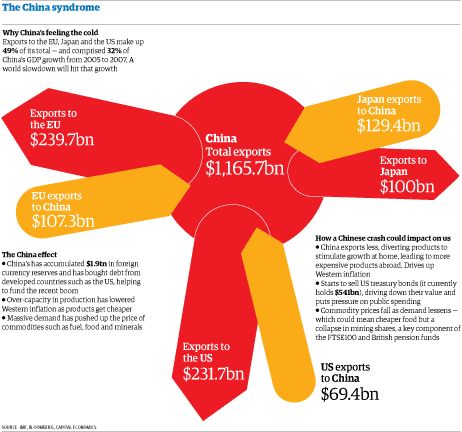 |
| Media photo |
While it is obviously true P.R.C. produces a good amount of the world’s manufactured goods, and a good percentage overall of those are produced not only in P.R.C., but have a history of increasing importance in such places as Singapore, the Pacific island countries, Australia, Japan, T’ai wan, South Korea and the region of Southeast Asia and South Asia – the lot of them. But what makes P.R.C. so important in its own right, with still its relatively low standard of living outside the urban centers after all these years, as a producer and exporter of goods to the U.S. and Western Europe and other presumably wealthy parts of the world? While P.R.C. holds maybe a little over a trillion U.S. dollars in the bills, notes and bonds issued by the U.S., it also has a very large population, now much over the billion threshold as reached some time ago. This means P.R.C. indirectly has financed its economic scale and demographic scope through making the decision some time ago to develop major business and commercial ties with the U.S. – the post – Cold War unipolar superpower. Also, while for P.R.C. as a country from the Third World bounding over into the First World to the extent it fulfills its political and economic mission of transition from a country emphasizing industrialization and renewed centrism overall, there are a small number of major inputs that contribute to the future economic prospects of the country; not of the P.R.C. administration, but of the economic activity in the country apart from government, including continuing to invest at least some of its current account surplus (not all can do that), conducting more reasonable and goal – oriented what we would call open market operations, increasing the scope of the social net at home, especially for aging workers; getting beyond the fluff of places like Shang hai and Bei jing to manage better its intake of foreign direct investment, and then under the guise of what it calls “Chinese characteristics” and a newer doctrine of its administration under the “Represents”, carrying on the business of actively managing its industrial and commercial base, and then economy overall without the ordinary corruption and parasitism that characterizes some growing economies these days.
P.R.C. might indeed show a much greater percentage G.N.P. growth than, mention France at this point that might be one percent. The recent estimates of Chinese economists about the sustained growth over eight or nine percent gross of that country’s economy as a whole does take into account the reports and numbers that are submitted to the center, though it does not quantify the actual numbers of what must be the shadow economy in the country that might be yet another significant source of growth, however illicit, to again enrich those who are merchandising unofficial stoves, televisions, handbags, and other goods and contraband at this point. In the former soviet union, for example, during glasnost, the shadow economy might have been as great as forty percent of the Russian gross national product at that point, and this gives reason for much of the exclusive and private wealth the oligarchs concentrated to themselves at the time (Boris Yeltsin is criticized for having allowed this and even encouraged it though future studies will probably show this vicious process was a Russian version of hastening the arrival of capitalism in the country.) The grey economy in P.R.C. at this point might be greater than that in Russia in gross terms because in China right now there are more people who need things, especially the aging worker population, and who have ways of raising the cash out of their life’s savings and so forth to put into the consumer economy – this is and has been a source of unofficial and substantive internal commercial growth for their economy since the time of Deng Xiao ping, and the thinking behind it as it touched upon the issues of young people there could have touched off some of the issues of 1989 that resulted in the administrations reactionary measures at the time. Rest assured that China’s economy being the way it is, and with room to grow in the area of consumer and durable goods, the grey economy has given the country a somewhat easy and unofficial way to deliver on its economic promises internally over the years. Time will tell if this and related activities actually enriches anyone and by whom it will be easy to see who the responsible people are for it, be they resellers, middlemen, or some type of ‘oligarch’ as has arisen in their neighbor to the West.
While the Chinese over the years, not unlike the former U.S.S.R., have chased bad investments in the name of entrepreneurship that sometimes have caused financial and other reorganisations, it is possible that the current limits to growth as a macroeconomic issue will call for less official trade inside the country due to slack in world consumerism and in its financial markets as well. This will be a good thing for anyone who has a lousy economy and who’s lending things to finance growth, and it might be difficult for example, for France in the next few years to have G.N.P. growth that even equals its inflation rate; so France might want to return to the financial well in P.R.C. consistently as long as China continues to purchase its bonds and export goods there. Remember that debt is not property nor is it a proxy for property and those in the French “patrimoine” stand in line as stakeholders in any problem with its bonds before the debtholders do. The rights of debtors and bondholders when in dispute can get quite technical, though it is clear that no matter how much of France’s debt bought by the Chinese, France will always be free of any specious claims on its assets or national treasures due to the character of its own open market operations and its international rights as a debtor. Outside the P.R.C., international trade rules, and this despite the slackening of some trade at this point in recent reports, maintain the status quo as far as practices and the production of goods and services in exchange for moneys are concerned. P.R.C. might be greatly concerned by slackening trade as it’s a major producer of goods at this point, but trumpeting the day – to – day problems of this is a way of calling undue attention to oneself, and while there are ups and downs every day, one has to wonder at the same time what the daily figures are highlighted for unless there are some practices driving the trade and commerce from P.R.C. that are questionable. Ordinary economic systems, capitalism being one of them, have very wisely built in features to absorb the everyday chaos of the marketplace and those angered or upset by ordinary ups and downs might be judged to not being able to see beyond their noses. These days, so many merchants and traders everywhere are concerned with quick scoring due to an incorrect sensation that’s how money is made these days – by a kind of high – pressure cooker tactics – based business climate. This is only so true as ordinary people want a basic standard of living, to have a place on the food chain and the like – this is the same in every country with wise leaders or fools alike at the helm. The current concerns about China as an economic engine that’s slackening are frightful to “Chicken Little” and because most of the world has market – psychology – based trade these days (they count what’s in their pocket books at the end of the day and decide if they’ve fared well or poorly, etc.,) it’s important that daily and monthly indicators (markets and CPI aside, maybe) be given time to return to their general patterns.
Related Becker – Posner Blog postings on the subject.
Thursday, October 17, 2013
Monsoon / Cyclone Season Again.
About cyclones from Japan meteorological site - click here.
Latest cyclone news from Bloomberg.
"IRIN" news about cyclones.
About monsoons / cyclones - click here.
Latest cyclone news from Bloomberg.
"IRIN" news about cyclones.
About monsoons / cyclones - click here.
 |
| Media Photo |
Again - Memories of October 1962.
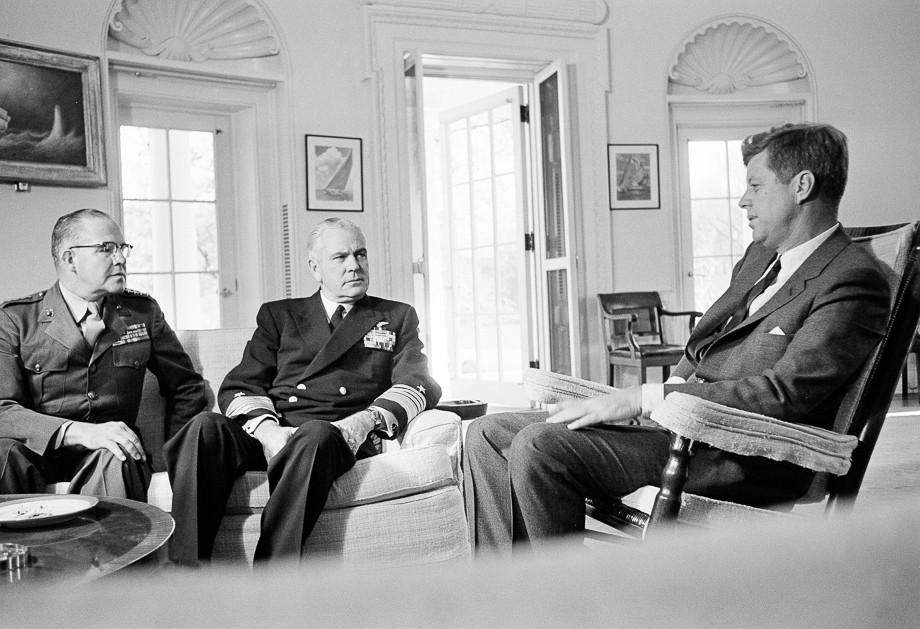 |
| Media Photo |
Many people do remember this time in 1962 as one of mutual concern, not just among those in the same town, but between the different members of the "global village," and today even among those having read just historical accounts. See this link for subject matter resources and previous blog entry from last year.
Tuesday, October 8, 2013
More on The NSU Trial in Germany.
That this particular legal proceeding is the most significant dealing with the far - right in Germany in years, and has been cause for great concern within FRG itself, it is not a huge subject of discussion nor real awareness outside that cultural and territorial surrounding. The crimes allegedly associated with the NSU ("National Socialist Underground") in their relative insignificance and in their overall morbidity are cause for concern not just in Germany, but in any country or region where there are individuals who are part of a system and who take advantage of this for their own ends or in order to otherwise and inappropriately take part in the sinister and dark, immorally punishing and even criminal world in order to bring attention to their personal politics. It is perhaps true, and there might even be a history of the NSU and related parties, that politically oriented people within a system like the democratic FRG, though they are not reasonably able to have a majority voice as, i.e., the politics of the nazis are disproven everywhere, resort to various tactics and vile and violent acts as the NSU apparently has. This is symptom of the cultural psychosis of anyone or any group condoning the crime of assassination and elimination of people as an allowable act under the circumstances the NSU might present to anyone.
In knowing in any detail about the mission of the NSU, it might be difficult to consider loving one's neighbor as oneself, inasmuch as one is not able even a little to trust one's neighbor. In the free country of the FRG, an excellent place, even the state chancellor is challenged when attempting to reply to questions and comments about the situation in the former Eastern Germany and its effects on people today, more specifically in the area of origin for the NSU that has been on the fringes socially, culturally, economically and in many other ways since the downfall of communism in 1989 - 1990. The political environment in the area of origin for the NSU is characteristically rife with ideas and attitudes that leave people grasping at straws about their own lives and in all quite angry and frustrated with things in the world, especially concerning influences that are non - German or that are from the outside. Remember if one judges the NSU outside of this particular proceeding that one can not just lay one's hands, proverbially, metaphorically nor otherwise on such problems as a way of resolving them and their effects. The circumstances of any showing of anti - Semitism or like idea today, in the world as we now have it with the related extremely mortal conflicts behind us, are quite special and individualized and despite the reality of this subculture of anger and awfully willful violence, there is through the humaneness with which the defendant at trial is treated in the Münich Higher Regional Court and that city's Stadelheim prison a comprehension of the conflict(s) people have experienced since the defeat of communism and official laying - to - rest of many far right influences in Germany itself. The case of Germany with respect to such issues is in itself extremely specific and special, and requires considerable and reasonable study in order to have any level of understanding of it. A good number of the answers to dilemmas proposed by the Bäder Meinhof in days gone by and the NSU today are the internal affairs of the country itself; to insist otherwise and to broadly apply these are nonsense and in denial of the watchful and ordinary conscience.
http://www.telegraph.co.uk/news/worldnews/europe/germany/10263998/German-neo-Nazi-trial-gives-insight-into-secret-life-of-Beate-Zschape.html - hyperlink to "Telegraph" (U.K.) article, September 2013.
In knowing in any detail about the mission of the NSU, it might be difficult to consider loving one's neighbor as oneself, inasmuch as one is not able even a little to trust one's neighbor. In the free country of the FRG, an excellent place, even the state chancellor is challenged when attempting to reply to questions and comments about the situation in the former Eastern Germany and its effects on people today, more specifically in the area of origin for the NSU that has been on the fringes socially, culturally, economically and in many other ways since the downfall of communism in 1989 - 1990. The political environment in the area of origin for the NSU is characteristically rife with ideas and attitudes that leave people grasping at straws about their own lives and in all quite angry and frustrated with things in the world, especially concerning influences that are non - German or that are from the outside. Remember if one judges the NSU outside of this particular proceeding that one can not just lay one's hands, proverbially, metaphorically nor otherwise on such problems as a way of resolving them and their effects. The circumstances of any showing of anti - Semitism or like idea today, in the world as we now have it with the related extremely mortal conflicts behind us, are quite special and individualized and despite the reality of this subculture of anger and awfully willful violence, there is through the humaneness with which the defendant at trial is treated in the Münich Higher Regional Court and that city's Stadelheim prison a comprehension of the conflict(s) people have experienced since the defeat of communism and official laying - to - rest of many far right influences in Germany itself. The case of Germany with respect to such issues is in itself extremely specific and special, and requires considerable and reasonable study in order to have any level of understanding of it. A good number of the answers to dilemmas proposed by the Bäder Meinhof in days gone by and the NSU today are the internal affairs of the country itself; to insist otherwise and to broadly apply these are nonsense and in denial of the watchful and ordinary conscience.
http://www.telegraph.co.uk/news/worldnews/europe/germany/10263998/German-neo-Nazi-trial-gives-insight-into-secret-life-of-Beate-Zschape.html - hyperlink to "Telegraph" (U.K.) article, September 2013.
Saturday, September 28, 2013
Les relations extérieures à la télé, ... .
Lettre publique destinée à la droite en France -
Cher Monsieur ou
Madame Représentant de l’U.M.P. :
 |
| Photo Média |
A l’occasion de
regarder le « PBS » aux EE.UU. aujourd’hui pendant l’heure de
l’émission « Charlie Rose », programme télévisé d’interview et des
évènements courants à présent, j’ai bien vu votre ministre [français] des affaires
étrangères, Laurent Fabius, ancien pilote d’avion de chasse, en parlant avec M.
Charlie Rose sur le sujet de la politique de la crise au Moyen Orient et
surtout au sujet des circonstances pour les rebelles et les challenges sur le
gouvernement syrien en faisant face a. à la politique et les conflits de
guerre civile, b. l’emploi du gaz [] sur le point des missiles
envoyées aux faubourgs de Damas, et c. au dialogue international sur les
liens entre l’état des affaires actuellement en Syrie, la politique étrangère
de la Russie et les efforts nucléaires d’Iran, Syrie et leurs voisins dans la
région.
La parole
de M. Fabius était formidable et est à suivre peut – être pour les raisons
suivantes : M. Fabius dans son fondement et formation voit bien les
perçus et attitudes, ambitions et la volonté de l’arabe sous Islam – ce qui est
une pointe de repère pour la politique socialiste influente dans votre
région. Egalement, il cautionne fortement un jugement sur la politique
syrienne en tant qu’encore soumettant aux souhaits Russes, Iraniens, et autres
en place au débat aux Nations Unies, même de la Chine, les pays de l’Afrique et
autres états non – alignés à l’assemblée de l’O.N.U. M. Fabius fortement
et de plusieurs côtés ait mentionné son rôle dans la conduite et la volume du
débat, et le rôle en même temps du gouvernement en France en offrant des avis à
faciliter une solution à ces problèmes extrêmement complexes une fois examinés
les courants de l’histoire quoique récente [en] la Syrie, et du « printemps
arabe ». Son point de vue, bien entendu dans le raisonnement des
socialistes dans votre pays, est exprimé dans une parole qui souffre d’un
analyse de base sous - détaillé aussi bien d’une hauteur qui ait montré de
nouveau les détails de la pensée vivement exprimée de son ancien chef
François Mitterrand qui n'ignorait souvent que
« l’Internationale » dans ses pratiques et pensées.
Celles - ci
pourraient être comprises autant perspicaces par les socialistes en France que
dangereuses par les adhérents aux autres coins de la politique en le pays dans
le sens que M. Mitterrand fût pendant l’époque très arrogant en son
pouvoir exercé au niveau de ces grandes lignes, une fois donné la politique du
pétrole, des terroristes dans la région et partout, des idées globales de
l’Islam et autres coins idéologiques et dogmatiques sur l’échelle en réaction à
la pensée, moralité, même la façon de vivre des français et françaises.
Ici compris est le hasard du parler familier dans les interviews à l’étranger
par les hommes politiques socialistes de la France qui sont souvent coupables
d’utiliser la presse et les médias à l’étranger en tant que labo pour leurs
idées faisant appel à leur point de vue mondiale. Laurent Fabius est un
homme brave et formidable dans son attitude pratique et son usage du langage de
la politique, et même encore en le cas qu’il conduit son avion de chasse ;
mais les idées délicates et susceptibles, et sensibles de la guerre en Syrie,
celles des armes très destructrices y utilisées contre les rebelles et maquis,
et les courants idéologiques dans le voisinage ne doivent pas être sujets ni au
niveau de l’expérimentation verbale ni aux regards en arrière vers les pouvoirs
de gauche du passé n’ayant pas été capable à résoudre ces difficultés ni pour
les français ni pour les autres. Les socialistes en France continuent à
chercher des richesses et l’influence partout en commandant une sorte de
dictature de la pensée selon l’ancienne - nouvelle politique
de Mitterrand qui se soulève à l’occasion d’un appel de la gauche en
France. La populace doit regarder sur ses caractères, et au – dessus de
tout de la gauche à ce sujet, dans les débats politiques à Paris et en
province, et dans le pays partout. Je vous prie de pardonner les fautes
stylistiques et d’orthographe ici et vous souhaite tout le bien pour le présent
et le l’avenir.
Avec mes
meilleurs aveux,
THS
Californie,
EE.UU.
Monday, September 23, 2013
Shang hai - symbol of success of the 'three represents' - belated book review.
The Man Who Changed China: The Life and Legacy of Jiang Zemin, by Robert Lawrence Kuhn, Crown Books 2004.
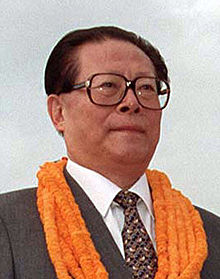 |
| Media Photo |
By the “Three Represents”, now in the lexicon of Chinese political thought and part of what the P.R.C. constitution preaches at this point, Jiang Zemin, leader of China during much of the Clinton and Bush years in the U.S., provided for P.R.C. pride and Chinese patriotism in his wording of a renewed emphasis on Marxist – Leninist thought, the dogma of Mao Zedong, and additionally Deng Xiao ping political / economic theory. While the rise of Shang hai as a provincial and commercial capitol in the P.R.C. was important for that country and coincided with the rise of Mr. Jiang (a former mayor of the city of Shang hai) who became the president of the P.R.C. These primary principles of political and ideological theory as espoused by Mr. Jiang in practice dealt with agenda items like modernizing the military on the mainland, modernizing political and administrative services processes and practices in P.R.C., and an effort to fight corruption in upholding age – old values of the “rule of law” and a spirit of “virtue” that have a long history in Asia under a Confucian tradition and other traditions on the mainland that recall the great historical legacy and rear view the administration has had after the events of Tian An men in 1989 when Mr. Jiang was a general secretary. Also included in any implementation of Mr. Jiang’s primary political theory were efforts to reform state – owned enterprises (SOE’s), and revamp the P.R.C. financial sector and rural economy, and the overall increasingly successful effort in itself of the Chinese asserting themselves in the world.
The commercial and business economy of the P.R.C. as of 1989 was still a “planned” economy, though the agenda items of Mr. Jiang obviously, with their rightist tendencies that had become more admissible at the time, facilitated more market – based activities in the country and in areas of P.R.C. influence politically and economically. This Mr. Jiang called “advancing through the times”, and I believe my quotes are not out of context here, in validation of the socialist market economy on the mainland, domestic and international, in a kind of “capitalism with Chinese characteristics”. Mr. Jiang, as a trained social scientist and natural scientist made all personal and professional efforts to revitalize the country primarily through simple re – emphasis and validation, again, of science and education, and this without interfering with the overall workings of the country’s establishment, especially the scientific one there. This was accomplished somewhat by sending young Chinese scientists to the U.S. to pursue college and university educations (in 2002 over 60,000 students of whom more than 50,000 returned home at the end of their educational terms). Mr. Jiang, despite being a scientist and engineering type, among the elite in his own state, in his public emphasis upon bringing up the country using his own methods, called for, validated and greatly lauded achievements among the greater populace in carrying out his principles and their practices.
The time of Mr. Jiang as president of P.R.C. saw pretty much the end of “state means of production” and “dictatorship of the proletariat” as well, though not primarily so, the “each according to his ability and each according to his need” – type civic governance so ridden with vice and corruption as it had been for years on the mainland, and ridden as well with other discouraging tendencies emphasizing the class struggle. These new principles in practice also meant the end of the overall leviathan power of industrial development and a new primacy recognizing the information age. In this, Mr. Jiang demonstrated missionary and fanatical zeal, especially concerning the outdated workings of the communist party and how masses of people were treated by the system on the mainland. These extremely successful efforts, probably the result of many other reforms besides the three basic principles above, and much more administrative and other work than meets the eye here, are reified in what many see today, citizens and tourists alike in P.R.C., as the achievements of the rebuilding, renewal and modernization of the city of Shang hai without interference or any cancelling out of influences of places in P.R.C. like Nan jing, Hong Kong, Guan dong, Bei jing and so forth.
It is also very important to know that the “Three Represents” comprise not just old and simple ideas as dressed up for modernity. These principles are communist ideas made to address new concerns of Marxist – Leninist ideology in advancing the productivity, status and dynamism and building up of a material civilization of this managed economy (no longer referred to, for example, as a non – market economy). The obverse of the Cultural Revolution, intended at the time to discourage intellectuals, these three new edicts call upon innovators, entrepreneurs, and intellectuals now in the vanguard of a “new society” as primary sources for building up the country. The text goes into considerable detail about how the implementation of these principles worked and much of the language behind them, especially the new de – emphasis of the party role vis – a – vis the masses (primarily industrial workers and farmers), that encompasses the party and the populace on all levels. Much of this new doctrine was criticized in P.R.C. from the left as ideological ‘pollution’, and as a result was only really established as Mr. Jiang recently left office. The movement itself is encapsulated in five primary public speeches by Mr. Jiang during the time 1978 – 2001 that illustrated the objectives of controlled political reform while preventing dissension and disagreement, repression and so on, especially again after Tian An men. Reforms were founded on a basis of enlisting socio – economic stability among the populace and for example, discouraging anti – capitalist (read “anti – U.S.”) attitudes, the greatest good for the greatest number, and a vision of success for all stakeholders – these factors all despite the absence of democracy. Considering the international public’s view of the success of newly – redeveloped Shang hai and related places, the achievements of the 2008 Olympics, successes in the war against terrorism, and acceptance worldwide of the new dogma; the efforts at reform have been even more successful with the country’s communist party that while it now cannot control everything allows some small non – communist political activities and party organisations, cooperation of non – communists and NGO’s with the party, and the new rise of the C.P.C. as a model guarantor of the state’s integrity, leadership strength and other attributes, Chinese nationalism, and new Marxist thought of which former soviet influences and followings. The three principles are said to have modernized the party, economics of the country, while retaining the traditional communist goals, structures and social rules that have been in place for more than a generation.
This was brought about by an emphasis upon youth and renewal, and new colleagial and consensus – building administrative guidelines. Those carrying out these efforts have presumably been part of the “inner party” of educated, talented, and sophisticated, dedicated elite acting against corruption and with a transitory character according to the modern realities of communism. With the legacy of Deng Xiao ping theory it has been very difficult to assure or re – establish social stability after the events of 1989, though Mr. Jiang is said to have provided the country with consistent reform efforts featuring his executive, engineering and leadership qualities: For Mr. Jiang, if you will, a sort of combination or cross between Beethoven and Shakespeare. Things might nonetheless have been like the old Phoenix Cardinals playing the Houston Oilers in the day, but this series of coup reforms by Mr. Jiang was quite successful and extremely popular at the same time as based on intellectual and patriotic ideas and the power of same in efforts as well to dispel income disparities, master world macro – economics and inflation and fight corruption, over – taxation and unemployment. The language used in the book mirrors the language about economics in the Western press and speaks authoritatively thereby, and by this calling for the old adage “trust but find fairness in it.” The text proceeds to illustrate how the new principles and processes worked, and goes on and on about much of it while richly illustrating the story of Mr. Jiang including a good section of chapters on early life and political formation. And that’s not all.
Monday, September 9, 2013
The Old "Follow Me."
This gets a little old, not to mention just the overall toll of the wars in the Middle East, but with respect to prospective ones, including a possible introduction to additional conflicts by the proposed air and other coordinated strikes the U.S. president is trying to persuade the U.S. public and legislature about at this point. In spirit, and in seeing the cataclysmic gassing of al – Assad’s people by their own, internally trusted regime, is an abomination. Most people are able to agree on that. Al – Assad will, win, lose or draw, in this current situation, cite extenuating and special circumstances relating to the status of those gassed and killed, or those gassed and injured, with a dismissal that characterizes the completely callous and unoriginally diabolical mentality as shown by the leaders of soviet client and former soviet client countries. Years ago, under the Hussein regime in Iraq, there was a huge to – do about the gassing and other violent things done to the Kurds in Northern Iraq. Hussein at the time simply indicated to a disbelieving and humane, and otherwise well – thinking Western public that the Kurds were unwanted and needed to be eliminated due to their rabble rousing and trouble – making on the Iraqis. This writer predicts al – Assad will use much the same rationale, that the people are unwanted and are hooligans and really nobody who knows his details really cares, and he needs to by this answer to a world judicial court for war crimes; the difficulty will be in enforcing international law and actually bringing al – Assad into court session, presumably in Brussels or in the Hague.
People like me are wholeheartedly in the camps of the current Secretary of State (John Kerry) and the U.S. president Obama when they call for military retaliation against the Syrian regime for the crime of using wide – area weapons, nerve agents and gasses that are carried by the wind and that cover more of an expanse under the circumstances than for instance a bombing would, against his own populace. This is not just because a report or two got out of Syria this had happened and people have to mention themselves in one camp or another, but simply because, and this despite the risks the regime has taken that have jeopardized its stability and further favorability to the West in westernizing and reforming its institutions; gassing people is wrong. Innocents by this meet their ends and others at least come very close to passing in very isolated, controlled and gruesome ways from this life, which had for them great value and great potential, especially among the young, and at least the morality of the destruction of gassing agents and nerve agents, etc., and the sinister and overall criminal minds by their deployment against one’s proper citizens, makes the act of using such agents inadmissible and criminal in act, intent, and in the planning and stated or unstated purpose of such attacks against, again, innocents for the most part. Despite the overall repressiveness of regimes like the one in Syria, and the connection of that regime to former communist principal(s) who are arms dealers and economic and commercial suppliers (sometimes gratis) of goods and other material for domestic consumption by the country’s elites and for war, its people should be allowed to live their lives to the fullest, and this given what is called for morally and normally within Syrian society. What has the U.S. president asking our legislature and others for support in an attack against these perpetrations is his, again overall and entirely correct, principal or self – governing rule or rules about the sanctity of human life; something extremely valuable taught in every college at Harvard and instilled in the gifted people who attend there. That academic experience having been only the beginning for many such people leads for many of them to further complexity and complications as to what should be done in circumstances such as are now in Syria with the regime caught in self – destructive mode and turning on its people.
What is to be done? By this writing, and because there is no consensus imperative, the Russian regime itself is readying or at this time shipping supplies and war machinery; arms and so forth, to Syria to deter and possibly abate a U.S. military strike before it might even be arranged, the facts here beg the question “What are you doing?” Such an interlocution should be allowed with the Russians compelled to answer as to what their intentions are in supplying arms, anti – missile and anti – aircraft, anti – personnel and anti – rebel devices and equipment in the scope of an outdated and obsolete purpose of constant efforts to “secure the near abroad” and so forth, and I paraphrase here. Such thinking, with the mobility of armies and air forces, and other factors is completely, obviously archaic and un – called for at this time, though these arms dealers, reason that in the deployment of their war apparatus they will probably handle forty percent of the issues against Western powers and influences they need to, and there will be so much conventional destruction that Westerners will tire of the conflict and pick up and go home: An example of pre WWII political thinking that needlessly and eventually caused so much damage. This is what has the State Secretary and U.S. president so involved in promoting their plans to protect and preserve what’s left of our allies in the places involved and their peoples, if not a good amount of the infrastructure in the country and other valuable attributes it has despite its not being, for example, a place like Israel, a modern functional country. Lebanon is probably a more functional place than Syria at this point and our U.S. president does not want to be chief executive as well of the Middle East. Absolutely not, and the talk of it, even anything provoking such impressions and thinking about things this way is nonsense and hogwash.
Thursday, August 29, 2013
A Great Problem - Solver from U.K. - See His Office Site on Middle East Topics (I Defer Here for The Time Being.)
| Media Photo |
What has Tony Blair been doing lately? (Click Here for an editorial.)
What is Blair doing in 2013 this summer? (Again, click here for articles and his office site.)
Sunday, August 18, 2013
This Bloody Strife - "Let Me Tell You, ... ."
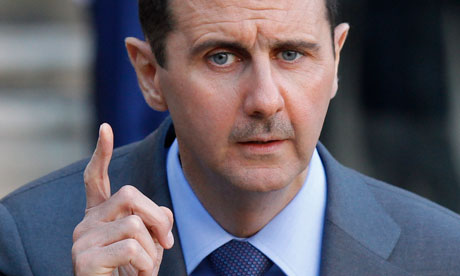 |
| Media Photo |
It is quite beyond this columnist why, apart from very odd political reasons of which a need for reasonable explanation, the unpopular and now widely covered bloody mess in Syria even continues at this point. It is possible as indicated by the Russians declaring this mess to be their business as well, that the regime in Syria fears passing into history, either as the result of the current guerilla - rebel uprising or another explosive and elite revolt, as an effeminized system of government after the death of the elder Assad in Syria and the accession to power of the current Assad. This fear is part and parcel of any conflict, armed or with simple verbal exchanges, in which attention is directed at Hezbollah as a participant and dates to the channeled and isolated violent ideas of the Abu Nidals of some years ago and the violent chaos they advocated in spirit and practice. I do not know specifically the Arabic terms for "ready, aim, ... ," and like many reasonable persons have no interest in them, and the current Assad regime has incurred additional moral and other debts of a sinister character by inviting Hezbollah and its sponsors from the East into this unviewable and violent home fracas. Even the network news coverage of the conflict is physically sickening, though also see press reports, of which: Lebanese press, "Wall Street Journal", P.B.S. "News Hour", U.K. Economics Publication, U.S., Virginia newspaper, ... (there is an outstanding C.B.S. television report from August 17 on this topic as well): All as perpetrated by those espousing in name, and tacitly and directly ignoring the culture and teachings of the prophets of Islam.
 |
| Media Photo |
Wednesday, August 7, 2013
Remembrance (in an inauspicious year) - Hiroshima.
Media Images.
Links to articles:
USA Today. CBS News. Voice of America. Christian Science Monitor. Washington Post.
Tuesday, August 6, 2013
Smolensk, Russia (Yesterday.)
 |
| Media Photo |
In his "Lettre à un ami allemand," the great critical thinker at the time, Albert Camus, opened the destructive and cataclysmic topic that is touched upon above as a question. In fact, what was the mindset that drove the German soldier, in fact the man in the street in places like Munich and Bonn, and other places in Central Europe, to give power to the attitude that the only solution to communist and leftist influences in Europe, Jewish question aside, was conquest and subjugation. This has been a topic examined, in the way the German military is understood to have worked and acted, as a kind of collective psychosis - "understanding" the German leadership a the time and so forth - though this does not, in fact it barely fills the vessel of knowledge and other facts and details to know and comprehend the enormity and importance of the European influence at the time and who had or has the most important role in it. The question asked by Camus in his essay that is critical to anyone examining the topic of the WWII Eastern Front, and that might have application even today insofar as historical examination of the time is concerned, was in what way did the German leadership at the time not believe and thereby take up arms against the communists / Marxists in Eastern Europe, that there was no single, peaceful solution to letting that geographical area and its peoples continue what reportedly and observably had been and promised to be a mistaken experiment in politics, administration, social policy and ethics, etc., by many people worse in their edicts and totalitarian practices than any hitlerian model.
There is no doubt that many admirable communist military personnel from the U.S.S.R., themselves good and ethical people, brave and valiant, went West to fight the Germans and themselves and did not return - again the number of mortalities exceeds the ability of one person to count them, though on a different scale, the number of German deaths informs; and their work to respect, recuperate and put their dead to rest; the international community of the greater wounds suffered by FRG in Eastern Europe and that society's continued efforts to address the implications of the related military conflict in public discussion over the years. In the overall examination of areas like the Eastern Front, in the thought of it all the way through to battle planning and execution on both sides, one "understands" the mystery about why the German leadership at the time placed such great emphasis, even political quackery, on what it believed to be the responsibilities of the time. Though many observers of what happened in Eastern Europe in the 20th century, and scholars, etc., do look at how and why the way Germany addressed this as an entirety from a moral and psychological standpoint, and from the standpoint again that German leadership was deeply flawed, there are probably a set of more thoughtful reasons that are the answer to the unknowns provoked by moral, ethical and other issues and explanations about it. Due to the overall interest in things like the Germans recovering their war dead, and how the soviets worked to discourage this, even to deface the idea of it because they at the same time gravely feared and loathed any respect German had nor has in the world; and the former soviets as well, there begins a process to answer the mystery and questions about the times in which Germans gave their lives in places like the Eastern Front. This not because they did so willingly and with politically - charged ideas, but because and out of a sense of obligation, perhaps even overriding economic, social and financial obligations as offered and predicted by the immediate future at the time. The soviets were equally zealous and messianic, if not more so, and there were greatly more of them.
The soviet cemeteries that I have seen in Eastern Europe are quite plain with headstones and
monuments, and other markings of the past conflicts there and the related mortalities. From the images of the new German cemeteries and the looks of them, the German ones are even more inauspicious and understated. For at least some individuals, people need to continue to know what happened in places like Smolensk and related and similar places of the time, and not only the political and other ramifications of this, and of the value of respecting and recovering the human element that might one day be relegated or forgotten, and the meaning and responsibilities that go with this equally passing. In view of what happened at the Eastern Front at the time, part of the sinister and criminal vice of the soviets, was to disallow and to deface and erase even the thought of Germans having any connection to communist soil. That this has been redressed now shows at least at this time, and as the result of things like the effectiveness of Perestroika, renewed and popularly discussed and understood efforts of everyone to comprehend the places of Europe and Eastern Europe and their influences in the world in order to avoid the loss of life in the future that took place there. Regrets for any typographical or stylistic errors in this writing.
"History" channel internet article.
Article from "Der Spiegel" online.
Online article from "RIA Novosti."
Subscribe to:
Posts (Atom)






